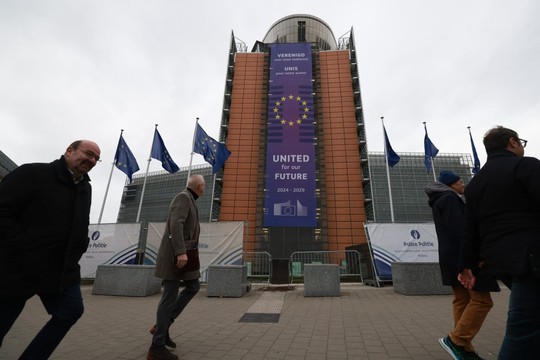Photo: SCMP
A 30-metre purple banner, hanging on the side of the European Commission’s Berlaymont building, is festooned with stars and reads: “United for our Future, 2024-2029”.
Across the road, the leaders of the European Union member states and its institutions huddled in a room for hours on Wednesday to discuss how this unity could be achieved in the face of generational geopolitical upheaval.
But the pursuit of unity has taken on new significance in a moment of extreme turbulence and polarisation. Everywhere its leaders look, they see powers trying to divide it. ‘Everyone talks about unity, but actually everybody is out to get the best deal for themselves and to avoid the absolute worst’, a diplomat said, ‘The South China Morning Post’ writes.
In the United States, president-elect Donald Trump shows the same disdain for the EU that he does with most other multilateral forums. He has vowed to wage a trade war on the bloc and abandon Kyiv, leaving the funding of Ukraine’s war against Russia to Europe.
China, meanwhile, is often accused of trying to “divide and conquer” Europe by offering economic incentives to members to water down their support for broader EU action against Beijing.
On both fronts, Brussels fears EU members will pursue side deals of their own that would weaken the union.
“Everyone talks about unity, but actually everybody is out to get the best deal for themselves and to avoid the absolute worst,” one EU diplomat said when asked about Trump.
Kaja Kallas, the bloc’s top diplomat, arrived for the European Council meeting telling reporters, “if we want to be a geopolitical power we need to act in a united way, then we can be strong and serious on the world stage”.
But behind the rhetoric, there is a fear that a bloc that has been stronger than its parts for 70 years could fall through the cracks of the biggest geopolitical shift in decades.
This fear was woven through discussions at Thursday’s summit that took in Ukraine, the Middle East, “Europe in the world”, a debate about the US, China and everything in between. On these big topics, unity is increasingly elusive.
On China, Kallas delivered strong criticism of Beijing’s support for Moscow, according to diplomats briefed on the private discussion.
Meanwhile, powerful members including Germany said during the debate there was still ample room for cooperating with China, pointing to the “partner, competitor, rival” lens through which the EU has categorised its ties with Beijing since 2019.
Trump, meanwhile, is threatening to bring a reckoning to Europe which hangs on to a liberal rules-based order when most other powers have left it behind. But their will to hold onto it is often followed by statements about wanting to work with Trump. To many, the two are incompatible.
Faced with these manifold challenges, a form of political inertia has taken root in Brussels. Despite years of discussions around how to prepare for the potential return of Trump, diplomats this week cautioned against making too many plans around an unpredictable character.
“It is very difficult for leaders to see if they’re on the same page without knowing what the page is,” said one diplomat ahead of the summit, which they said would not be “about decisions, but about exchanging views”.
read more in our Telegram-channel https://t.me/The_International_Affairs

 9:39 22.12.2024 •
9:39 22.12.2024 •























